
You are logged in as
Logout
You are logged in as
Logout
Dear Parents and Caregivers
In this newsletter I’ll outline some information on the qualification that your son or daughter is engaging with this year. As part of that, I ask you to closely read the section on the LitNum CAAs that Year 11 students are being assessed in early in Term 2 (this is part of the section Key Reminders About NCEA – Year 11/Level 1 NCEA – What are the targets?)
Also in this newsletter is a hyperlink to a video that I encourage you to look at, that being the NCEA video produced by NZQA. Please do click on this link provided later in this newsletter and take a look (it’s only around five minutes in length).
But, before you view that video, please click on this link that will take you to the recording of the NCEA Evening that was held on Thursday 15 February. This will tell you much about the NCEA ‘journey’ as it unfolds for students and their parents this year.
Along with the above, I’ll use the different parts of our NCEA page on StACNet, and the Community Portal, to help you learn about some key aspects of NCEA as it occurs in the College. You’ll find that we provide you with much information and enable you to easily access your student’s NCEA information in an ongoing way.
My hope for parents is that they take NCEA in bite-sized bits and so eventually get their heads around it. More newsletters this year will provide you with further ‘bits’ but, if you ever have any questions that you’d like clarified or explained, please do get in touch with me.
If you want to jump ahead and find out more about NCEA before my next newsletter, please click the links below to visit the NZQA website.
HOW NCEA WORKS >NZQA BROCHURES >
More newsletters this year will provide you with further ‘bits’ but, if you ever have any questions that you’d like clarified or explained, please do get in touch via email at DBV@stac.school.nz.
Kind regards
David Bevin
Head of Teaching and Learning

In my February presentation to parents, rather than provide a whole lot of information about the workings of NCEA, at this early stage of a student’s (and that of their parents!) NCEA ‘journey’, I talked about how important it is for parents to understand some of the ways in which they can help their child along the way – what are the issues to be aware of? How can parents help their students manage their commitments? Their time? And so on….
It’s always good to know what lies ahead for your child as the busy life of a parent can often make it hard for them to know what to look out for. This table shows in very brief form how the year is looking.
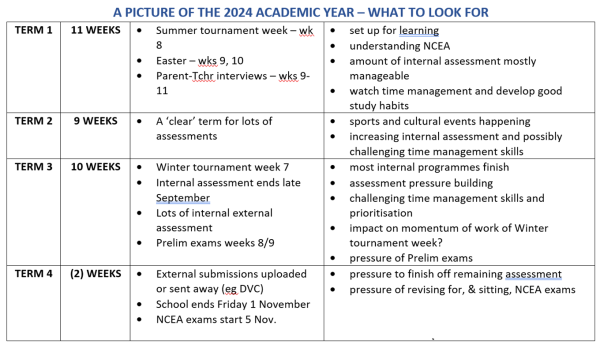
The above diagram outlines the ‘shape’ of the academic year and very simply shows what lies ahead and what to watch out for when it comes to assessment commitments because every internal assessment has a significance attached to it. It’s very easy to see where things might possibly come to a bit of a ‘crunch point’ for students.
Where does your child fit into this picture? What are their commitments likely to be this year? What, and when, will be their ‘crunch/pressure points’? How do they cope with such points? You really should talk about this with them and have some honest discussion about how to manage. I would even advise you and your student to go as far as plotting on a calendar or a wall planner as many of the key events as they know of at this stage of the year. Right now, students are able to include their Term 1 assessments and, by looking through their course outlines, can gain an indication of what assessments happen later in Terms 2 and 3 in particular.
Early this term, I spoke to students about what they need to show and do to manage the demands of Level 1 NCEA. Alongside developing their knowledge and understanding of the course content learnt this year, students need to:
A good number of students don’t experience too many problems with managing their various loads while, for others, it’s a real ‘jolt’ and a challenge to their ability to manage their time, prioritise their commitments and cover all of the assessment demands made of them.

And then to:
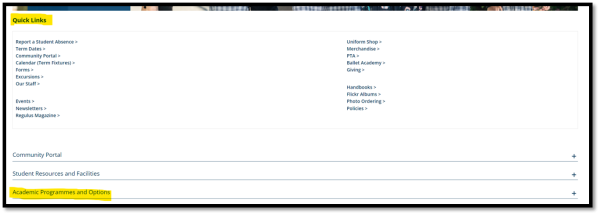
And from there:
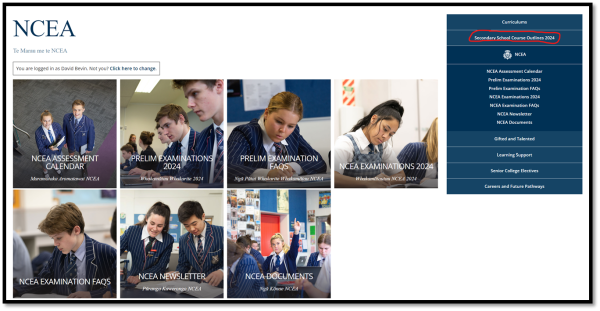
To access all of our course outlines that are available on the College website, simply log into StACNet, then click on the ‘Academic/NCEA’ page, you will then be able to access the ‘Course Outlines 2024’ folder as shown in the screen shot above. All Course Outlines for this year are presented in very similar formats so that you can quite easily find your way around them and will be able to read through the subject’s assessment information. This will help you and your child to gain a good view of the subject’s assessment programme for the year and so manage that planning task.
In the above, screen shot above you will see what information about NCEA you can access. Throughout this year, the various folders will be updated as needed and you will regularly be referred to one or more of them in my newsletters or in emails that will be sent to you.
Your ‘go-to’ StACNet page for all things NCEA looks like this. Throughout this year, these various pages will be updated as needed and you will regularly be referred to one or more of them in my newsletters or in emails that will be sent to you.
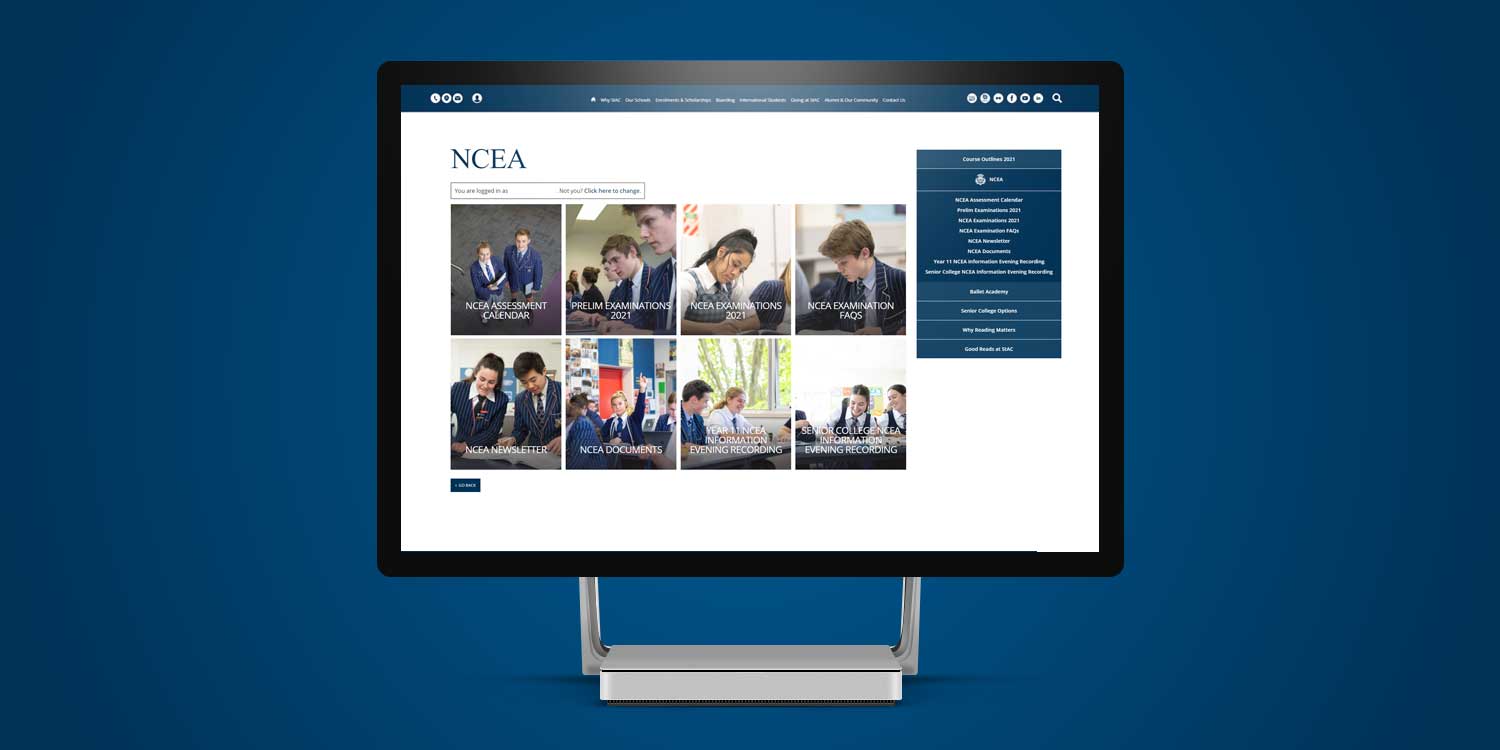
Internal assessment is obviously the big concern for students this year. Most students will be assessed in up to 12 internals across the year. A few students will gain their NCEA through internal assessment before they even sit the external examinations in November and, as such, internal assessment is ‘high stakes’.
We have clear rules and procedures for students to follow covering many matters including student absence from an internal, late submission and breaches of authenticity and these are all detailed in the student copy of the ‘Rules and Procedures’. All Year 11 students received their own copy of the ‘R & P’ in last week’s tutor time; they must be sure to read them as the rules must be, and are, applied in all assessments.
In my next newsletter, I’ll more fully explore the rules that we apply to the management of internal assessments, however, issues around extensions and absence from assessments occur every year and have begun to occur already so it is important for you to know that we have clear processes and rules for managing those issues so that assessment is fair to all students. Students simply cannot just hand in an assessment late or not turn up to a test without having a valid, and approved, reason. They must follow our procedures in this area.
Earlier this term, a post was placed in each year level’s Teams page providing the link to the online form for applying for an extension in an NCEA assessment. Our process is very simple, and I can already confidently say that it is working well, having received over 400 applications this year already.
Earlier this term, all NCEA-level students and parents received an email from me about how we are managing this issue. In it, I outlined this information (this is also contained in the above student document for NCEA).
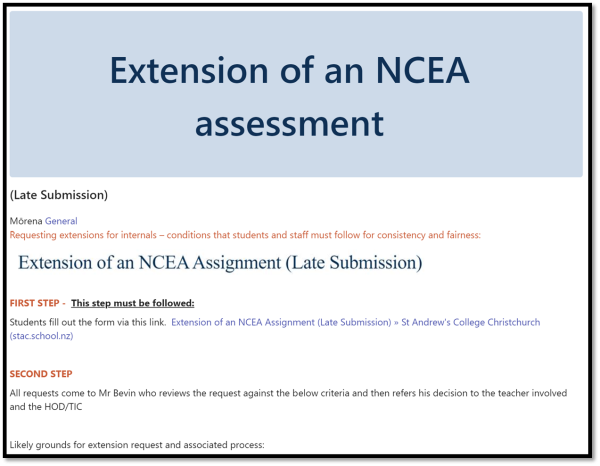
Note about Medical Certificates: For medical conditions, students must provide a medical certificate as part of their application as shown here; if they do not, they will not have an extension.This is non-negotiable on the school’s part.

The NCEA Assessment Calendar is found on the NCEA StACNet page.
This very important calendar provides some overview information about what assessments are on when, according to each year level. Please note that assessment programmes are of necessity a little ‘fluid’ and therefore dates sometimes change; teachers are expected to keep students and parents informed of such changes so please understand that what is on the Calendar, while it’s accurate, is not ‘set in stone’. The NCEA Assessment Calendar provides an important way of helping your child to programme their commitments term-by-term.
 It’s very relevant at this point to remind you of the ‘one-stop shop’ nature of our Community Portal, which sits within StACNet. Parents are able to access a lot of information provided by the College with regard to attendance, assessment and reporting.
It’s very relevant at this point to remind you of the ‘one-stop shop’ nature of our Community Portal, which sits within StACNet. Parents are able to access a lot of information provided by the College with regard to attendance, assessment and reporting.
When you click on the Results tab on the right of the screen, you will be able to access both the Fortnightly Feedback and the ‘powerful’ and dynamic NCEA Current Results Summary. This particular document enables you to see the grades that your child gains over the course of the year in their various internal assessments and practice/indicative assessments and their progress towards Level 1 NCEA awards, such as certificate and course/subject endorsement. You no longer have to ask your child to tell you what their assessment results were because you can see them through your own login!
When you click on ‘NCEA Current Results Summary for (your child’s name)’, you will be able to see the subject, standards, credit values and, when results are recorded by teachers, grades gained for those standards.
At this early stage of the year, it’s a good idea to have a look through this information so that you can see just what assessments they are likely to be doing. Early on, very few results will show but as the year progresses and internals are completed, it will become very interesting reading that you will not need to ask your teenager to show you – there’ll be no ‘hiding’ from results! The summary table ‘NCEA Results Summary’ provides an excellent summary of ‘Achievement/Merit/Excellence credits’ that are being gained and so shows a student’s progress towards a Merit or an Excellence endorsement.
You will of course be very familiar with these ‘snapshot’ views of your child’s attitude and effort in class as we give you feedback on these most fortnights through the year. In my video presentation, I talked a little about the importance of these in terms of a student’s academic progress and achievement. There is a very clear connection between a student’s attitude to learning and their effort in class and their overall academic achievement. So far, teachers have provided two Notes; we report in this way, but we don’t notify you that they are there. Remember that this term for example, Notes are provided in Weeks 4, 6, 8, 10.
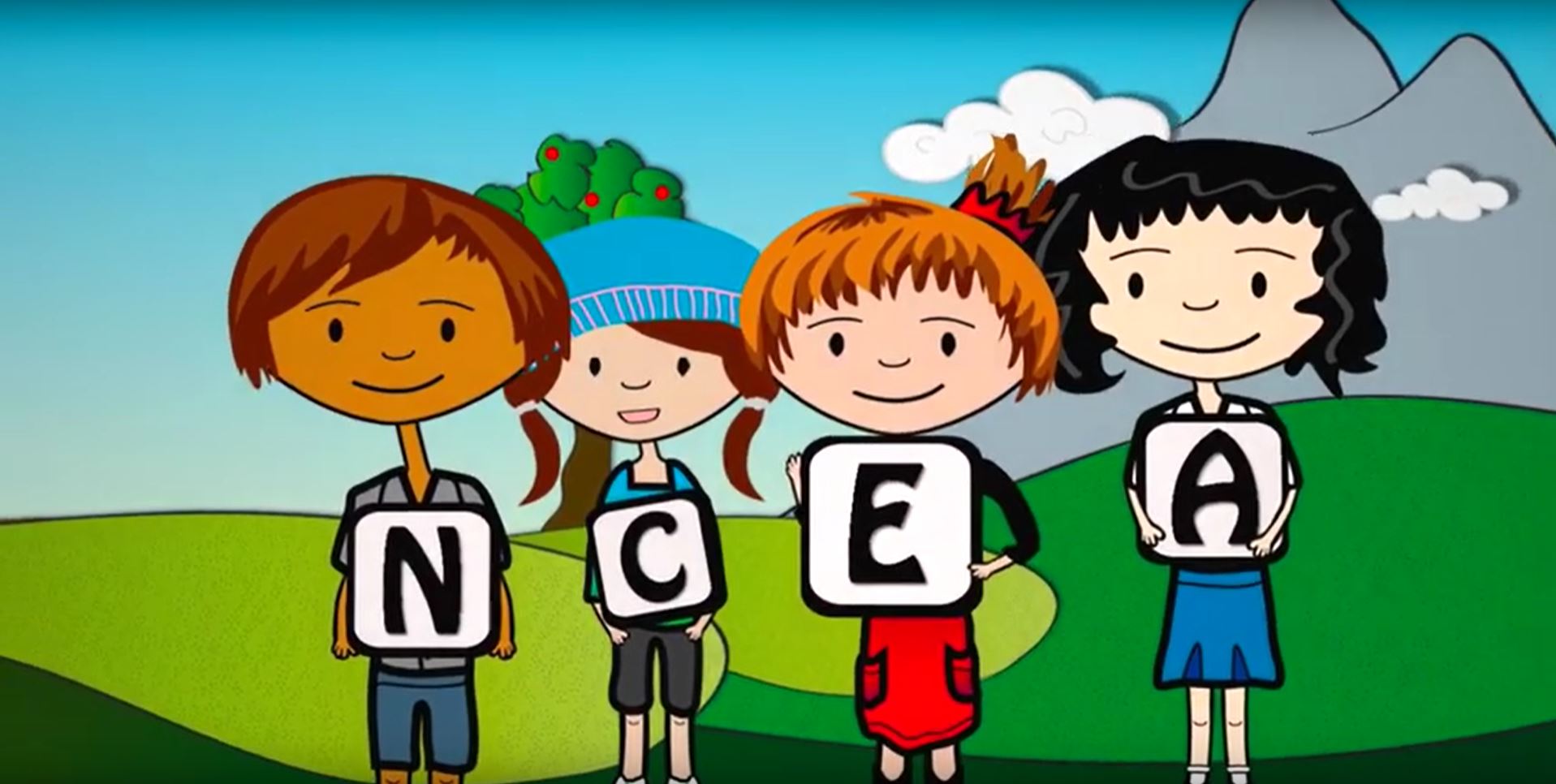
This 6-minute NCEA video is a very good starting point for parents new to NCEA. It is updated annually and is therefore very current.
To view the video in other languages, click here.
Video credit: NZQA
To help you a little bit more, in our Year 11 NCEA Rules and Procedures, I have provided a model that I hope very well describes for you in diagrammatic form NCEA Level 1. So, along with that model, a few of the key facts about how to gain NCEA Level 1 and certificate endorsement that can be gained with it.
NCEA assessment and awards are about the gaining and accumulation of credits (similar to points) and grades from the various internal assessments that are done in class during the year and in the externals (mostly examinations but also other forms such as portfolios) at the end of the year.
These students gained up to 20 Level 1 credits from their Science course last year. The good news is that their credits are added to their Level 1 total this year. Any Excellence or Merit credits gained last year will be added to their totals this year and so contribute to their overall endorsement total for Level 1.
To gain Level 1, a student must gain at least 60 credits from assessments of Standards (mostly called Achievement Standards) and there is no requirement for a certain number of internal, or external, credits. All Standards have a number of credits attached to them and by gaining a Standard, the student gains the associated credits, and grade (there is no difference in credit values whether the grade is Achievement/Merit/Excellence).


A student can gain Level 1 with Merit if they total up Merit or Merit and Excellence grades with their associated credits to at least 50 from any Standards (internal or external).
To gain Level 1 with Excellence, they must total Excellence grades with their associated credits to at least 50.
Students can take more than one year to gain this endorsement and can add to their endorsement total any grades, with their associated credits, gained in the previous year in that Level. This is particularly important to know for those students who are also doing Level 2 (Year 12) courses as part of their overall Year 11 programme this year.
In early March, all parents received the following email from me. If you haven’t read it, please take a few minutes to do so now; if you have, treat it as a refresher and have another read – we’re getting closer to this new and significant event. This email also covers important matters regarding device readiness for online NCEA assessments and exams and students and their parents planning to attend examinations and CAAs this year.
Dear Parents
In this email, I would like to bring to your attention some key matters regarding NCEA this year. Before the end of this term, you will receive a link to a fuller newsletter about NCEA.
Device Readiness for all of 2024
Late last year, parents may have received a request from the College regarding the need for some attention to ensuring the readiness of their student’s device for completing the range of NCEA assessment in Level 1 this year. Throughout the year, students will be completing internal assessments digitally. In addition, all students will be completing some internally-sat external assessment in term 2 or 3 and, in term 4, many NCEA exams will be digital only. For all of these assessments, students will be required to use their device which will be expected to be in good working condition and able to last the full length of a 3-hour exam in particular. The College will not be providing backup devices unless absolutely necessary so the onus is on students to maintain their device so that it can be relied upon throughout the year. Students have already been informed of this and I would ask that you once again check with them so that you are reassured about the readiness of their device, the battery life especially.Looking ahead at 2024 exam dates and planning for attendance
A big feature of NCEA is ongoing internal assessment along with Prelim examinations in term 3 and NCEA exams in term 4. Please be aware that the Prelims are very valuable assessment opportunities in that, along with providing feedback to students on their progress to date in externals, they provide the all-important derived grade for NCEA externals in term 4 - Derived grades :: NZQA. As such, all students are expected to attend their Prelim exams at the time that they are set down for. In early term 3, the Prelims timetable will be published in full detail while the NCEA exam timetable is already available on the NZQA website (NCEA exam timetable :: NZQA). Prelims will take place in the period Wednesday 11 to Thursday 19 September and parents are asked to ensure that their student does not have other commitments that will prevent them from sitting their Prelim exams at the times scheduled; a rescheduling of an exam will be very difficult to provide and will be provided in exceptional circumstances only.NCEA LitNum co-requisite assessments – (National) Common Assessment Activities – 20 – 31 May 2024
2023 Assessments
Last year, most Year 10 students sat a number of NCEA online assessments as they worked towards completion of the 20-credit LitNum (Literacy - Reading and Writing, Numeracy) requirement for the new NCEA - NCEA Changes for 2024 and 2025 :: NZQA. To gain NCEA students must complete this co-requisite; in 2023, Literacy – Reading and Numeracy were assessed and results for those assessments were made available to students in their NZQA Learner Login in August for those who sat Numeracy in June and in January for those who sat Reading and/or Numeracy in October/November.2024 Assessments
Writing / Reading / Numeracy (3 separate assessments, sat online with students using their own device) - these assessments will each be sat in class groups in single assessment sessions through the period 20 – 31 May. More details about LitNum will be provided in my fuller newsletter and students have been checked with to confirm their understanding about which of the standards of the required 3 they have already achieved.Literacy – Writing will be sat by all Year 11 students and is the third of the 3 standards to be sat and achieved for LitNum.
Literacy – Reading will be sat by those Year 11 students who did not sit or did not achieve the standard in October/November last year.
Numeracy - will be sat by those Year 11 students who did not sit or did not achieve the standard in October/November last year.
Please do look out for my newsletter as there is much to tell you, following on from my 15 February presentation to parents, about the NCEA Level 1 year. If you have yet to view the recording of the presentation, a link was emailed to parents on Monday 19 February.
“Dear Mrs & Mr Shaw
Please see a link to the video recording of the Year 11 NCEA Information Whānau Hui held Thursday 15 February. Please note, you will need to sign into StACNet to watch the recording”.
Please note this information from our Special Assessments Co-ordinator, Shelley Broad.
Parents typically find it difficult to know who to contact about an NCEA issue that may have arisen for their child: